‘No family member would ever do that for me’: Migrant worker with cancer on Singapore volunteer’s help
Helping workers who are badly injured or ill, or families of those who died, is time-consuming and takes an emotional toll. Volunteers from migrant worker groups share why their work does not stop at Singapore’s borders.
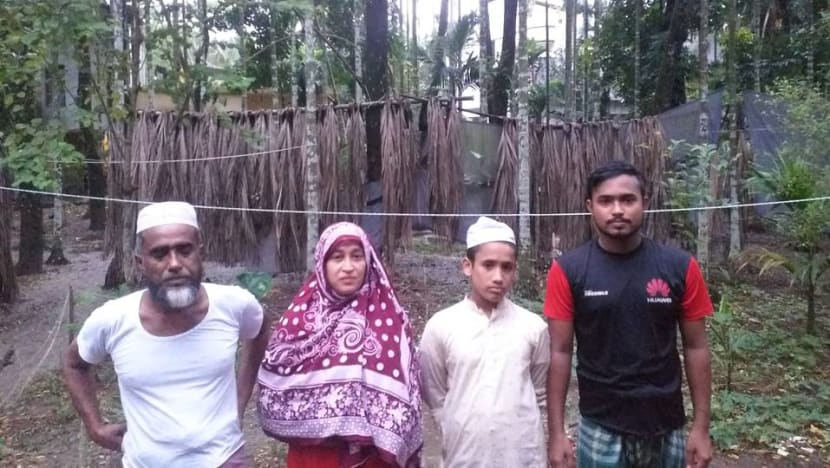
Migrant worker Abdul Mannan (left) returned home to his family after he was diagnosed with cancer. (Photo courtesy of Abdul Mannan)

This audio is generated by an AI tool.
SINGAPORE: Imagine having six WhatsApp chat groups to sort out banking, medical and other matters for a migrant worker with a brain tumour.
Or spending a month sourcing stoma bags and getting them to Bangladesh for a former construction worker with cancer — at a time when the COVID-19 pandemic has splintered supply chains.
This is what volunteer Akash Mohapatra has been doing from Singapore for the past 15 months. Outside of work, the 53-year-old legal counsel at an investment bank is busy solving cross-border problems for needy migrant workers who have left Singapore.
The cases involve workers who died or were severely injured, and Mohapatra and some fellow volunteers from ItsRainingRaincoats have supported the men and their families long after the tragedies occurred.
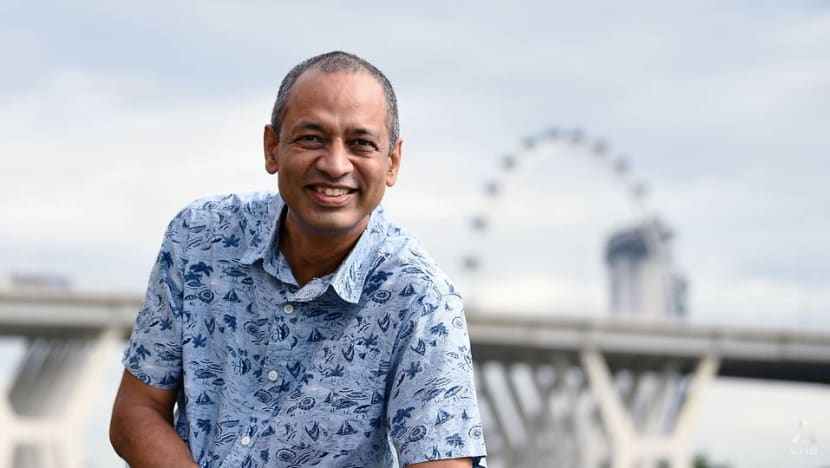
They have offered grief and financial counselling as well as practical help to families of those who have died.
For workers who have been badly injured or seriously ill, they have helped to get them safely repatriated and ensured access to treatment and medical supplies in their home country.
To both groups, the volunteers have offered friendship, encouragement and help to figure out viable long-term income streams.
Migrant worker non-governmental organisations (NGOs) in Singapore primarily help workers here who face difficulties such as non-payment of salaries, lack of access to healthcare and abuse.
But in certain cases, volunteers have found that their work does not stop at Singapore’s borders or when the worker is no longer here: The workers or their families would be left helpless and destitute otherwise.
Assisting the workers only in Singapore may be “half the journey”, as Eric Lee, the 53-year-old director of SG Accident Help Centre, put it. And the statistics bear this out.
Between 2016 and last year, the number of workplace deaths a year ranged between 30 and 66, according to the Ministry of Manpower’s Workplace Safety and Health Report 2020. The construction industry, which employs many low-wage migrant workers, has been the leading contributor to these deaths.
The number of major workplace injuries a year ranged between 463 and 629 over the same period. Major injuries include blindness, amputation and paralysis.
There are also deaths and injuries that are not work-related and would not qualify for work injury compensation.
A car may knock down a worker riding his bicycle after work, or he may have a heart attack while he is not at work. Some workers have also committed suicide in the past 15 months as the pandemic and movement restrictions took a toll on mental health.
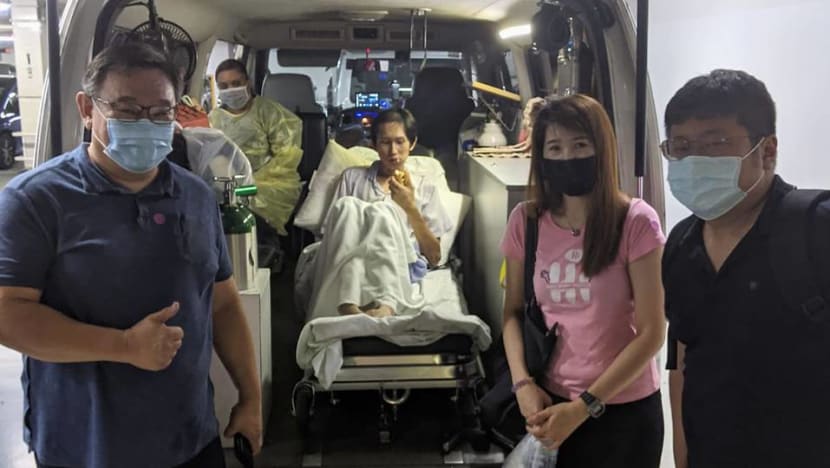
It provides physical therapy, occupational therapy and Traditional Chinese Medicine treatment for migrant workers here. Sessions are free for injured workers or S$5 for those who are working.
He had another reason. “I also wanted to travel more to China (to follow up with injured workers) and couldn’t keep taking leave,” said Lee, who once flew six hours and sat 10 hours in an ambulance with a returning worker before arriving at the latter’s hometown.
SG Accident Help Centre helps a few repatriated workers a year, with five such cases in the past two years. They include workers who were paralysed by work and road accidents.
On visits to countries like China and Bangladesh, Lee checks that the workers are continuing with their treatment and how they are getting on with their families.
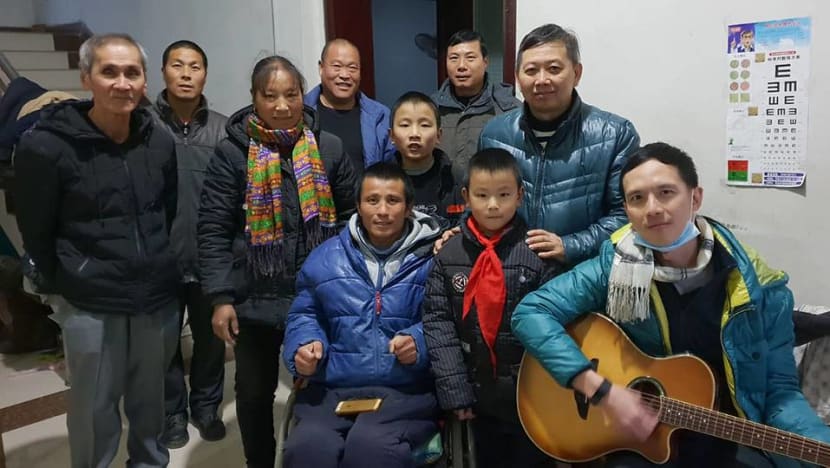
Injured workers may not tell their families the full story about their injuries, which means their wives may not understand why their husbands are constantly at home now, or why they are unable to do the jobs they previously could, he said.
“It’s just in their nature not to (talk) about the bad things that happened (abroad),” said Lee, who facilitates conversations between the workers and their families when he visits.
He also puts injured workers in touch with one another. “They have common topics to talk about, like food or working in Singapore. They become friends and can support one another. When we’re there, we always link people from the same province together,” he said.
ItsRainingRaincoats, meanwhile, has helped about 15 to 20 cases of repatriated workers who were badly injured or ill, or families of workers who died, said the group’s founder, Dipa Swaminathan, 49.
A CALL FROM THE DOCTOR
NGO volunteers first learn of serious injury cases through other migrant workers or doctors in hospitals here. The doctors may see employers wanting to repatriate workers who are not yet stable or fit to travel. So they seek the workers’ permission to share their plight with the volunteers, said Mohapatra.
That was how he got to know about Bangladeshi construction worker Abdul Mannan.
Mannan was taken to hospital last December after severe diarrhoea. He had been feeling unwell for two months. In hospital, doctors found that he had kidney problems and stomach cancer. He underwent surgery to create a stoma, or abdominal opening, for waste to flow out into a bag.
Helping him has been far from straightforward. Before Mohapatra could speak to the 46-year-old for the first time, he had to get another ItsRainingRaincoats volunteer to top up credit in Mannan’s phone.
He tried to get an understanding of Mannan’s home situation and began making arrangements for the worker’s cancer treatment in Bangladesh. Through a friend’s friend in the country, he got Mannan plugged into a charity that helps cancer patients.
The contact managed to get Mannan access to chemotherapy and even arranged for a vehicle to take him to the hospital in Dhaka — about 95 kilometres from his home — and back.
Mohapatra also put Mannan in touch with Singapore-based cancer survivor and Bengali speaker Subhadra Mehta, who has been sharing her experience of chemotherapy with him. “He was scared in the beginning, but I told him chemotherapy is good for his condition and helps him,” Mehta said.
Through her as interpreter, Mannan told CNA Insider he felt hopeless when he first learnt about his cancer. He thought he was close to death and that there was no way to pay for treatment. “With help from Akash, I feel much better,” he said.
“I couldn’t imagine this kind of help. … No family member would ever do that for me.”
Surprisingly, both men had never seen each other in person, or even on their phones, until this month when CNA Insider interviewed Mannan using video on WhatsApp. They had done only voice calls before that.
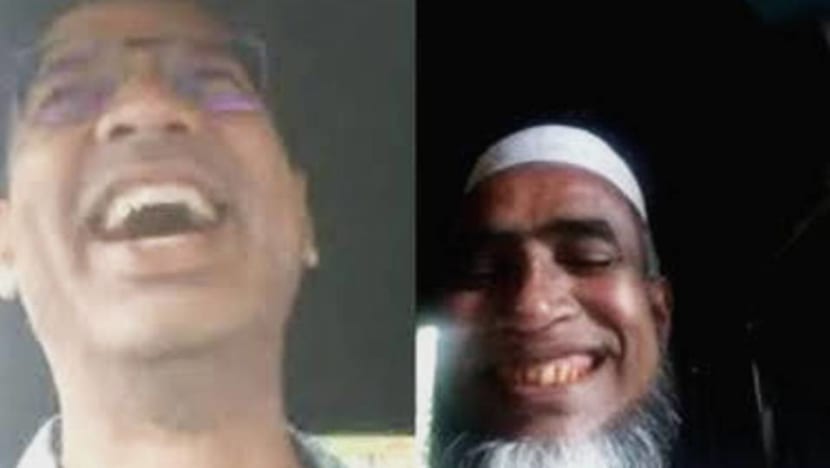
In April, when Mannan’s stoma bags ran out, Mohapatra had to figure out how to get hold of new ones. He located the nearest supplier, got a doctor’s prescription, arranged for a courier firm that could work around disrupted flights, and called a friend in Bangladesh when the bags got stuck in customs.
Mohapatra paid the US$570 (S$776) for the bags and courier out of his own pocket, but he quipped: “The pain of the courier was much more than the (cost of the) bags.”
‘HELP COMES WHEN YOU TRY TO DO GOOD’
In cases of death, it is his fellow volunteer Indu Sukumaran Nair who first steps forward to offer grief counselling.
A trained grief counsellor at a voluntary welfare organisation, Indu started volunteering at ItsRainingRaincoats around the same time as Mohapatra in April last year.
She had read about migrant workers being particularly affected by the pandemic and about Indian worker Alagu Periyakarrupan’s suicide after he was diagnosed with COVID-19. She wanted to support the community, so she wrote to Dipa on Facebook and then was connected to Mohapatra.
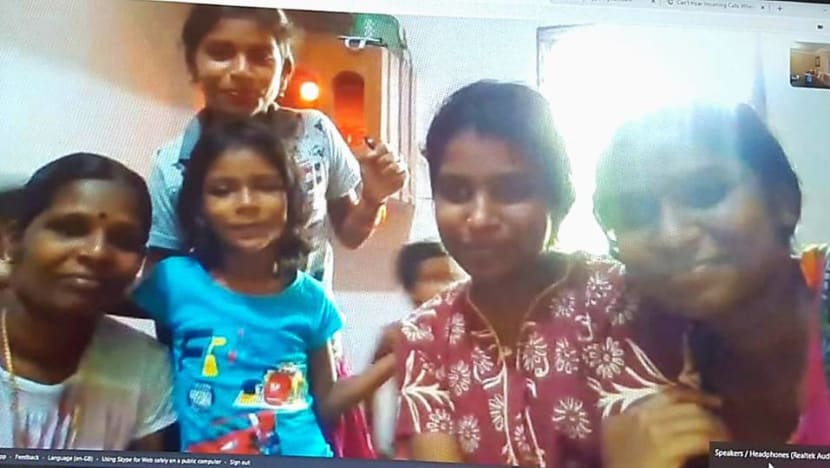
Since then, the 50-year-old has provided support to several widows. Being able to speak their language helps to build rapport, and they slowly open up to her, she said. “In the initial stages, it’s (about) being with them. … I call every day,” said Indu.
“Sometimes I figure out a time when nobody else is around them (so they can speak more freely). It could be 9.30pm in India (12am Singapore time). It’s also easier to get through (on the phone) at night-time.”
The calls could last for an hour, or more if the women feel like talking about the challenges they face, perhaps problems with their in-laws. They may not have anyone else to share their problems with — finances may be a source of family tensions, and widows in India face societal stigma.
The relationships Indu has forged were apparent during the interview with CNA Insider one Sunday afternoon, when she received calls from two widows, one of whom was worried after not getting through to her for a few days. (She had called Indu on a phone the latter had left in the office.)
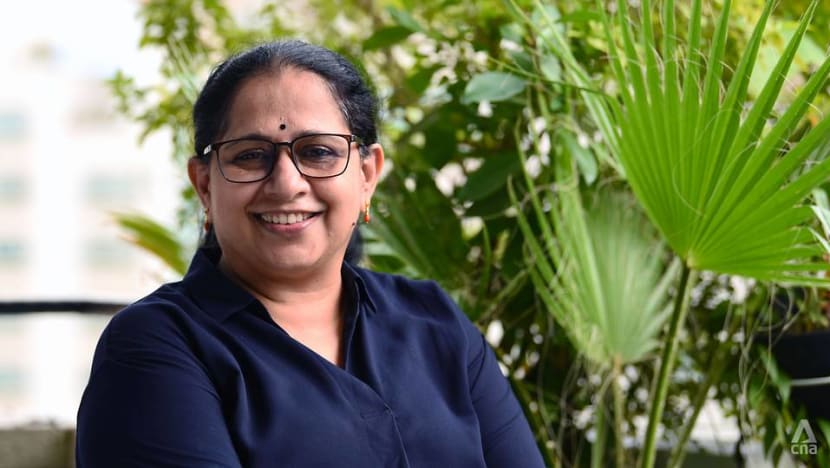
“What I usually do is, rather than talk about things they can’t change, I shift their focus to things they can control,” said Indu.
She counsels them to be discreet with money and keep what they have for themselves and their children, instead of giving any to people seeking loans or with dubious investment opportunities.
Volunteers also help to channel any private donations to struggling workers or families. But they emphasise that it is not the most important focus of their work.
Mohapatra said basic money management is important. He has called friends who work in banks in India to get local branch managers to visit the families.
Besides checking in with them, the managers can help them understand how to manage their bank accounts, keep their fixed deposits safe and even sign up for things like health insurance.
Mohapatra has many contacts in India because he lived there for 30 years before he moved to Singapore, where he is now a citizen.
His father was in the Indian Army, and the family lived in many cities when he was growing up. He attended school with other children of military personnel, and some former classmates are now in the Indian Army.
He also attended St Stephens College — a college of the University of Delhi and one of the best in India, with a “huge alumni network” — and worked at a bank in India for a few years.
“When you try to do good … and reach out to people to ask for help, help comes,” he said.
Using my networks also helps me reconnect with friends. Sometimes when you seek help, you make the bonds stronger (and) the multiplier effect is huge: A friend ropes in someone, who ropes in someone.”
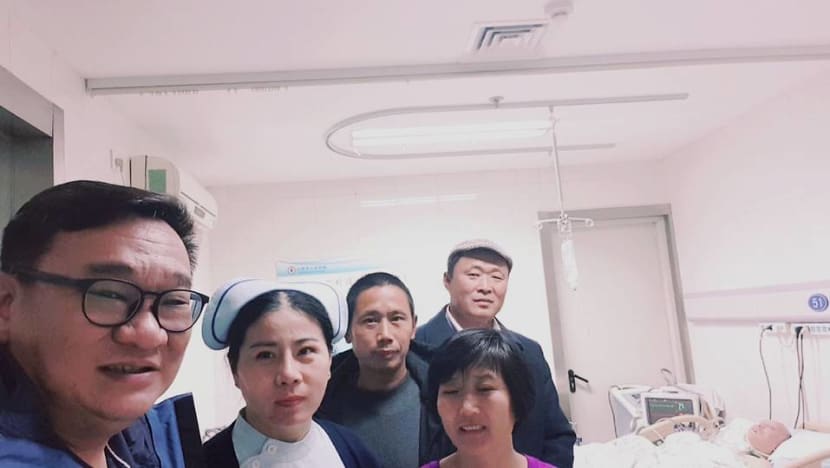
During last year’s circuit breaker, many migrant workers could not work and worried about supporting their families.
With seed funding from an anonymous donor and with the help of a team at the National University of Singapore’s College of Alice and Peter Tan, SG Accident Help Centre took part in a pilot project to defray the university expenses of workers’ female dependents.
The project supported 16 women — sisters, daughters and a wife — in Bangladesh, who were interviewed by students from the NUS college. They each have received two disbursements of funds totalling S$575.
SG Accident Help Centre volunteer Tan Lai Yong, who was until recently the director for outreach and community engagement at the College of Alice and Peter Tan, said: “The idea isn’t just to give money; our students connect with the students over there.”
The Singapore students did some research on university fees in Bangladesh and kept paperwork minimal, using social media platforms to verify that the recipients were bona fide students, he said.
‘HARD, BUT THE RIGHT THING TO DO’
Asked what could improve the situation of workers they help, Mohapatra and Indu said grief support is crucial, as is financial support and rehabilitation. Translation services in hospitals is also essential.
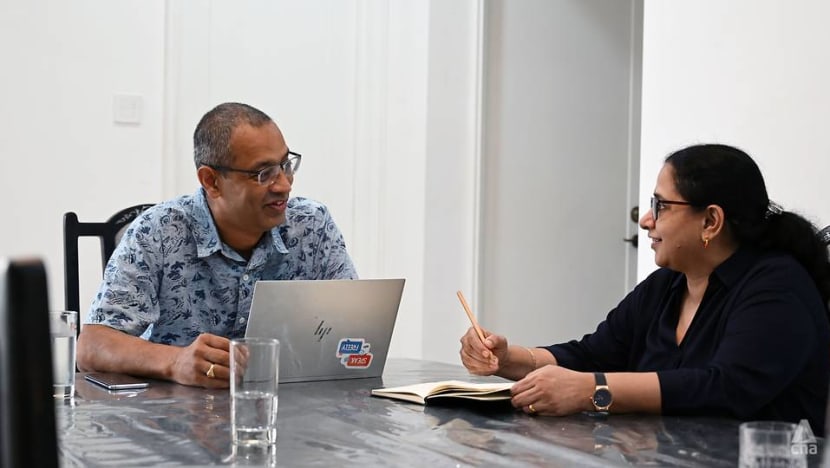
To help the families of workers who die or are permanently disabled in non-work-related incidents, Mohapatra suggested there could be life insurance that pays out S$30,000 to S$50,000 in such circumstances.
Premiums could be split between employers, the authorities and the public, because “all three are beneficiaries of what the workers do”, he said.
While work-related deaths and injuries are claimable within Singapore’s Work Injury Compensation framework, non-work-related tragedies are not. Workers may engage lawyers if they believe there are parties at fault, but cases can take years to resolve. Lee has assisted workers whose court cases are ongoing, for example.
Helping families who have lost their breadwinners is “heart-wrenching work”, said Dipa, whose group also distributes food and organises activities for migrant workers.
“It’s the hard thing to do, but it’s the right thing to do,” she added. “From a spiritual or philosophical perspective, I think it’s important to ensure that the families are okay.
These men came here to provide for their families, but also to build our city. And they died in the course of their work or as part of their lives here. So we owe them that little bit in return.”
ItsRainingRaincoats, along with many other migrant worker NGOs, is part of a new coalition called the Migrant Workers’ Group. Facilitated by the charity Law Society Pro Bono Services (LSPBS), it aims to enable migrant workers and other stakeholders to better understand and leverage available resources.
For example, a worker receiving social assistance from a member NGO may require legal help that it does not provide, said the LSPBS. Through the coalition, the worker can be referred to other members.
The LSPBS’ Ad Hoc Pro Bono Scheme could also cover workplace accident and death cases that meet its criteria, which include being of limited means and having a meritorious case.


















